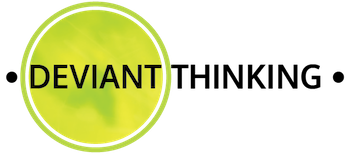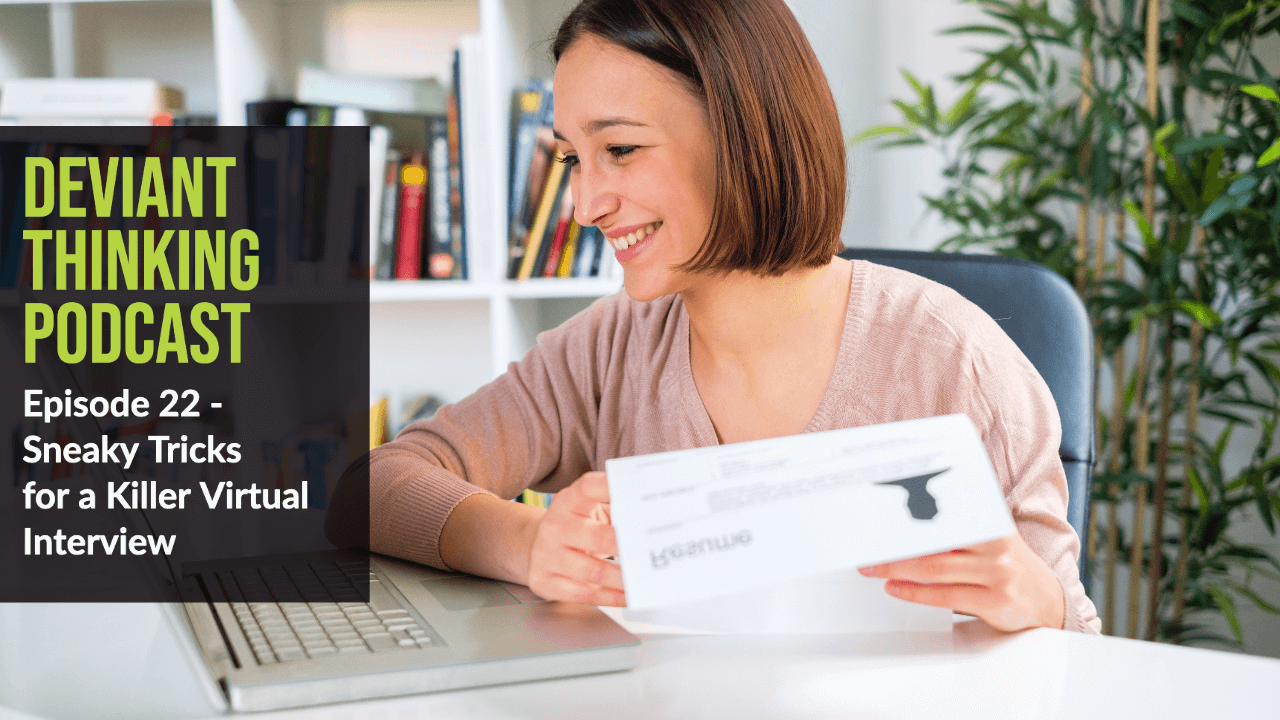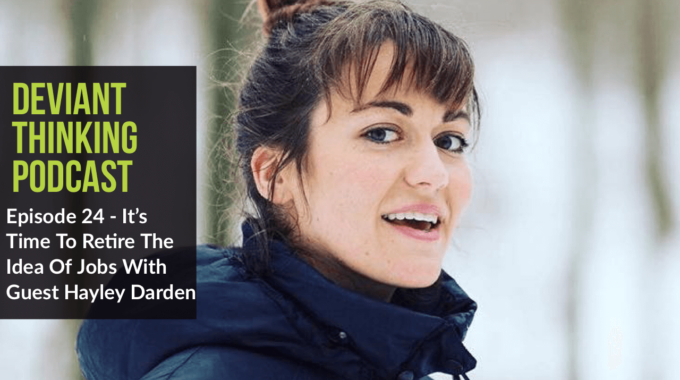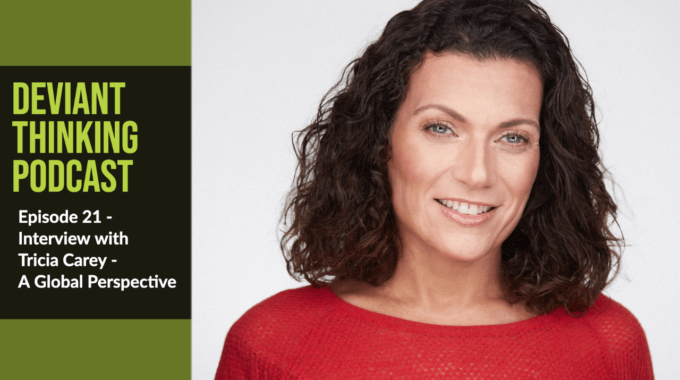CLICK HERE TO DOWNLOAD THE TRANSCRIPT (PDF VERSION) Jennifer Thompson 00:00 Welcome back to The…
CLICK HERE TO DOWNLOAD THE TRANSCRIPT (PDF VERSION)
00:00 Welcome to the Deviant Thinking Podcast. I’m your host, Jennifer Thompson. And today as always, we’ll explore career advice that breaks the rules. Before we get started with today’s show, I do want to recognize that I know many people are hurting and struggling with their jobs right now there are more people out of work and furloughed than we have ever seen in our history. And I really respect that. So I’m kind of excited to share I really want to help people get their resumes ready and get out there. So for the month of May, I will be making a very special offer that you can get the coupon code at the end of the show that will help you get your resume ready and out the door to hopefully land you that great interview. And that great job
So stick around till the very end and make sure that you get that code, because it’s a great offer that will be here for the month of May. Well, I hope everyone is staying safe, hanging out at home, and maybe even enjoying a little bit of the downtime that they have. But this time isn’t going to last forever. And I can see things picking up I can see people being interested in getting out there. And one of the things that we’ve been talking about is what are the changes that are going to be out there in the terms of interviewing as we move forward. There are jobs out there, which is great news for anybody who is in the job search, but we’re going to go about our hiring process in a much different way. We will probably eliminate for now in person interviews and do a ton of things online. And that creates some unique challenges and some unique opportunities for any of us. So today, it’s all about really optimizing the online setup for interviewing. And I have a little experience in this. I do a ton of online work. I’ve been working with clients over zoom for many, many years. I am not a news Zoomer. Glad to have so many people come to the platform now. But I have some really great advice on how do you prepare yourself for that online interview. And the good news is, there’s some great tips and tricks out there that can help you really maximize this media so that you look even better than you could look in an in person interview.
So with no delay, let’s jump right in and talk about interviewing in a COVID age interviewing online. And really, how do we maximize this in a great way so that you can land a job that you love. Let’s start with the basics. And the basics are just that. It’s kind of the minimum that needs to happen for you to have a successful interview. And while I’m going to tell you some great things, none of these things are groundbreaking, but I also didn’t want to skip over any of this, it would be a miss, and if I assumed that you knew this, so just be a little bit patient with me as we go over these basics, but know that there’s some good stuff coming about how to really maximize your setup and maximize yourself. We totally go beyond the basics here in this podcast, and I promise to share some tips and tricks that you have never heard before about online interviewing. So just be patient as we get through the basics and get to the good stuff.
04:09 So the first basic is test your technology. This is very important. You don’t want to get on to an interview and not have tested your technology. And there’s a myriad of ways that you can do this. But definitely put your camera on, get yourself a headset or a microphone, put it all together. And if you’re going to be using zoom, have a friend join you on zoom so you can take that moment so that you can set things up in a great way and know that everything works because there’s nothing worse than it be one minute to the time that you’re supposed to be in an interview and technology not working. That being said as well, technology right now is a bitch folks, internet is slow, so many people are at home, you definitely want to take this time and have a backup plan as well. When I’m going to do a zoom call right now, I have my regular internet available. I’ve tested my phone hotspot connection. Sometimes I’ve even gone to another location to make sure that I have really good internet because it’s a little funky, with so many people online and it is not letting up anytime soon. The internet is not nearly as stable as it’s always been, definitely take this time to test the technology. So that’s our first basic.
Our next basic is think about your background and surroundings. Almost everybody is doing zoom video interviewing or a version of that it might be Hangouts on Google, it might be the new Microsoft product but almost everybody is on video and you want to be the best you can be on video. So you want to check your background, set yourself up in such a way that you have something attractive behind you. I kind of always laugh I do so many zoom calls with folks, one of my favorite things to do is kind of spy on folks and notice what their background is, and especially if they have a bookcase behind them. I want to know what they’re reading. What are they thinking about? It tells me so much about them. So if you happen to pick that desk setup, and you’ve got that stack of books behind you be deliberate with what you put there. It actually can help portray you in the in the right way. So make sure everything about your background is deliberate. If you truly don’t have a great background, pick a blank wall. There’s a blank wall somewhere in your house that you can use. It might be in your closet, take down all the clothes, it’s okay you’re not it’s not permanent and set yourself up in front of that blank wall if that’s what’s needed. Most of the online systems also allow you to put a virtual background in place. I’m not a huge fan of this though I see it glitch an awful lot of the time. You know where you’re talking to someone and especially any of us who have lighter hair, you know, if it’s thinks it’s a green screen background, suddenly the backgrounds coming through your hair and it totally looks fake. Unless it works really, really well. I would skip that and really create that background that makes sense behind you and is real. Also know what your camera angle is. I think this is an important piece. You want to have a camera angle that is really flattering to you. And in general, that means looking up at your camera just slightly. I also caution that when you’re doing an interview You look at the camera, I know that’s a little bit uncomfortable. But that’s actually where the eye contact comes through is through the camera. It’s not looking at the person’s face. Also be careful if you have a setup where there’s more than one thing going on. So for myself, I have multiple screens, whenever I’m doing an interview with someone, and they’re going to see me and I may be looking off at another screen at any point, if that is relevant to the conversation that you’re that you’re having with someone, I always tell them that I’m looking off at another screen.
I recently held a town hall where I was on video and I acted as the moderator. And as we started, I was just really clear with everybody in the audience, that I’ve got multiple screens going on, and I’m doing that so that I can moderate and I can take people’s questions and so on. And while that’s not exactly relevant to an interview, I think it does show the point of like letting people know what’s going on around, you will definitely take any of the questions out. So if you’re staring off to the right, and they think you’re staring off out the window, you know, they’re gonna know, hey, I’ve got another monitor over there and I’m looking up some data or I’m looking at my resume to be able to share it with you. Sometimes even if I have notes in my hand, I will say that as well. You know, I’ve got a copy of my resume right here in front of me. And you’ll notice I’ll be looking down at that I’ve also got a notepad here because I want to be able to take good notes on what’s being said today. So you can’t take for granted that they can understand what’s going on on your side. So sharing that just a little bit. So that hint is really about that background, making sure that setup giving people that idea of your entire surroundings and kind of the space that you’re you’re interviewing in and definitely think about that camera angle. I am not an expert in camera angles. But I promise if you will do a YouTube search on how to set up your system for the most flattering look, you will absolutely find some great videos out there that talk about the lighting, the background, but camera angle, all of that. And definitely take the time to do that. If you’ve got an interview, you want to show up looking your best. And there are some great ways that you can inexpensively set up your home area to make yourself really, really look good.
The next hint is make sure everyone in your house knows what’s going on, and that you’re going to need private time for this interview. This sounds really simple, but I can’t tell you how many times I’m on zoom with a client and their kids come bounding in or the dog starts barking and there’s no one to help them out. So I always say try to make time and make sure that everybody body knows what’s going on. And with this you can do a couple things you know, if you happen to be lucky enough to have an office that you’re you’re interviewing in, don’t leave it up to chance that your kids are going to remember that you’re having an interview, take a minute, put a big post it note on your door and say busy now interviewing Do Not Disturb.
11:21 Oh my and that was perfect. I couldn’t have planned it better if I tried. Also, remember to shut off your phone. You want to get rid of any distractions and folks that was legit. I forgot to shut off my phone. We don’t want to hear that especially in an interview you want to make it appear and it really be that you are 100% focused on this interview. So you want to make sure to shut off that phone, tell other people that you need this time to anything you can do to be distraction free. And if you have a situation if you have a small child, if you are living at home at home alone, and something weird might happen in the middle of the interview, the baby might cry, the dog might bark. Just be honest up front and tell them that that might happen. It really shows your best ability. It shows that you know, kind of what your situation is, and you’re really aware of it. And I think it makes you look much more professional. If you tell them about it up front. Then if something happens, and it gets a little crazy in the middle of the interview, and they don’t expect it people don’t like things that they don’t expect. Again, often I tell people about my dog. I’m like, yep, I have a dog here and we’re doing a podcast interview right now. And if the dog starts barking, I’m really really sorry. I’m just going to stop for a second until I can get my dog calm down. Again, makes people feel comfortable. She very rarely barks and a podcast, but if she does, no one’s surprised by it. They’re not put off, they’re able to stay focused as well. So you want to tell your situation. So that hint is all about making sure that you set up your time in a really clear way so that you don’t hit distractions. The other little bit is know where the mute button is. If you noticed, even in this podcast, as soon as the phone started going off, I was able to hit pause and stop it so that you didn’t hear the phone go on for as long as it did, I had to get up, shut it off all of that, but I was able to hit the mute button fairly quickly. If the other person is talking, and you hit the mute button, no problem, they can keep talking and they don’t have to hear the baby crying in the background or something. So you really want to know kind of again, going back to the technology know the technology well enough that you can manipulate it as you need to. So that’s some of the basics, making sure we know our technology making sure we have a good background a good camera angle and making sure that we’ve set up the time and the space that we need to do a great interview. Now, let’s get on to the good stuff. I have some great hints for really upping your interview. And I think there’s some hints that maybe some other people haven’t told you about. And we’re going to start with my favorite one. When I do an interview, and I’m on video, I cheat. Yep, I totally cheat. I make sure I know what I want to say. And then I have a whole outline, but you will never see it. Because what I do is I get one of those great big 3M, post it notes, and I write all of my notes on it. And I put it up on the wall behind my camera, and I put it up on on the wall behind my camera, so that as I’m looking very clearly in these people’s eyes, as I’m doing my interview, if I’m at a loss or whatever I wanted to talk about it on the wall behind them. So I can flick my eyes just ever so slightly to some of the talking points. I wanted to make sure that I covered and they will never ever know that I’ve looked at my notes. So you see, when you’re interviewing at home, there is nothing that says you can’t have notes for your interview. Be smart. Put your stories put things that you want to make sure that you talk about up on that post it note know the questions that you want. Any of those things you can put up on that magic little post it note was a little make it big make it easy to see they can’t see you and you can put it on the wall with no problem. So that kind of comes to my second hint. And they’re kind of related here because it’s all about know those stories. I bring this up a lot when I do talk about interviewing, you know the things that you want to tell a perspective, company, know what you want to share, and make sure that you get to own that part of the agenda. And again, it’s a home interview, you get to cheat, you know, where I think most people feel it’s awkward to walk into an interview with a lot of notes. In this particular case, they can’t see your notes, they don’t know that you’ve got a whole list of notes hidden behind that camera. So know what the stories are, know what those things that you want to highlight are, because they’re going to it’s going to make it easier, really takes the stress level down a whole bunch, when you know what those things are before you go into an interview.
The next thing is to have great questions. Just because you’re on an online interview doesn’t mean that you can’t have great questions and I think this is going to be even more important, because you’re not doing the company tour, you’re not meeting 10 people, as you walk through the office, you’re gonna have to ask questions, to be able to get to see what this company is all about. I believe that you should ask even more questions in an online interview, and make sure that the interviewer gives you time to ask those questions. I think if you can share that insight that, you know, I’ve got a bunch of questions here today, you know, it’s a difficult because I’m not getting to walk through the organization. So I’m going to ask a couple extra questions to really learn what your organization is about, to me that makes you sound like someone who is serious about the job that you want to know as much as you possibly can about the position that you’re really in to doing what needs to be done to do your due diligence to make sure that you’re both a great fit. So what kind of questions should you ask? I’m a big believer and asking the hard questions, asking questions that are beyond theory, right? The simple theory question might be, tell me about your company culture? Well, I’ve said this before on this podcast. I personally think that is the worst question that can be asked because it generates the worst answers. If you ask, what’s the company culture for this organization? You’re going to get their canned answer. It’s normal. They’re they’re trained that well, I worked at corporate for many years. I mean, we knew what our corporate line was. And I unconsciously would give that line whenever asked that in an interview because I knew that’s what our that’s what we strived for our come true. See if I can talk here and see it’s okay to make mistakes as well. I’m going to leave that in purposefully. Because I think that’s really human as well. And I think you’re allowed to do that even in a real interview situation. So back there, we were told what our company culture was to be like, and we were told what it was aspirationally So when someone asked us about company culture, it really came right off the tip of our tongue of what we aspired our company culture to be, I don’t know if it really was actually as great as we made it sound. So what questions could have been asked instead, that would have exposed what the culture was truly like? It’s all about those behavioral questions. More than likely, if you’re going to be interviewed, you’re going to be asked questions like, tell me about a time when you had to deal with conflict. Tell me about about a time that you had to achieve something without enough information and maybe not enough resources, right? They’re going to ask the specific behavioral questions, so that you have to answer with what you did, not what your theory is about what you would be doing. So let’s flip that around towards the company. If you want to ask behavioral questions towards an organization, instead of asking about the company culture, you can ask questions like, can you tell me about a time that you had to deal with conflict? You know, within this organization? What does it look like when people don’t agree? Hmm. They’re going to give you a very different answer to then what is the company culture? My personal favorite question is asking someone about what’s the greatest success that you all have had recently. Can you tell me about that? Again, that’s a big behavioral question that really pins them down to describe very clearly an exact example as opposed to going into theory. So really encourage you to think about, you know, two to three behavioral questions that get really specific so that you can learn much more about this organization. Because if you’re doing a virtual interview, all those tools that you normally have with you, when you’re on site in an interview, you know, your eyes, kind of that peripheral vision, just that gut feel as you walk through an organization and see people interacting, you’re kind of flying blind without it. So you’re going to have to ask different questions, you’re going to have to ask harder questions you’re going to have to really dig in to determine if you’re a great fit for each other. So do so and check about culture, but check by asking those true behavioral questions. Try to stay away from theoretical questions, because everyone’s theory is going to share their best possible scenario, not really the reality of what goes on within the organization. Video interviews are definitely not something to be feared. I personally find them exciting, I find that they can be focused in a way that on site interviews can’t be, there’s much less distractions, and I think you can do a great job on a video interview. So I want to encourage you all to feel comfortable in this kind of new setting where you’ll be doing more virtual interviews, I think there’s huge value and huge upside to be able to be here we go again with the tongue tied there. huge value in being able to work virtually. It allows a much lower cost for the company and yourself. It allows you to sneak an interview in in the middle of the day. So if you’re looking for a new job right now, you’re not needing to take time off from work to go out to an organization. So some really great benefits to interviewing. And again, I love that idea of having those notes kind of hidden from everyone so that you are able to really articulate and get to the point you want to make, kind of have one bonus idea as well and it’s about mindset. I want you to go into an online interview with the same excitement that you would go into an in person interview, and I think this is a little bit harder when you’re at home. The kids are yelling, there’s schoolwork that needs to be done. Dinner needs to be cooked right lots of distractions in this world we have right now so many people being at home. So the hint is really get your mentality in the right place.
Amy Cuddy does a great TED talk on how your physical body really can help you perform mentally in the situation. So I will link to Amy Cuddy’s TED talk in our show notes and I highly recommend watching it. But to cut to the gist of it. What she recommends is making sure that before you go into an interview, that you use your body to set yourself up for success. So what that means is before the interview, don’t be sitting there working on emails all hunched over and let the notification timer go off two seconds before you need to get on, give yourself time to put your body and your mind in the right state so that you do feel powerful for me. I get up, I walk around, I stretch my arms high up into the air, I make sure I take up tons of space. For me that’s really important. I want to feel like I’m projecting kind of in all directions. And when I do those things, it really aligns my body and my mind together. So I can show up fully, I can show up enthusiastically, and I can do a great presentation, a great interview, whatever it is in that space. So I want you to consider that as well. If not, don’t just worry about the logistics of it. Also worry about that head to space. Get yourself your body and your mind aligned get into that really powerful state so that you can show up in interview fully, interview with enthusiasm and be just downright prepared. That wraps up today’s episode of The Deviant Thinking Podcast. I hope you found it super useful. We talked about some great things we talked about the basics, making sure that you tests the technology, looking at that background and surroundings camera angle, all of that. Making sure we designate this time as your private time and knowing that you need to get rid of as many distractions as you can. And then my favorite tips, the good stuff, the stuff nobody else is telling you. That secret tip of putting that post it note up behind the camera. Whoo my favorite I’m telling you do it all the time. No one will ever know you’re looking at that massive post it note with every detail that you need to know on that should be your story. It should be great questions that you have. And then maybe the most powerful thing of all is making sure that you get your mindset in the right place. Unplug from those other things before you do your interview and get ready to really shine.
27:19 As promised at the beginning of this podcast, I have a special offer for you. My online resume course called Hell Yes, Resumes Masterclass. With or without the resume review, I am offering at $150 off. Holy smokes. I have never offered this big of a discount. But I really respect that folks are out there. They’re eager for new jobs and they need help. So I have been working hard at doing some great updates as well to this online class. There’s some great new material that’s out there and I want to celebrate that and share it with all of you. Because I know you want a resume that truly is remarkably different that helps you stand out from the crowd and will get you noticed. So this online class is going to have a discount for the rest of the month of May for $150 off and to get that discount, all you have to do is use the coupon remarkable, so remarkable for those of you who have trouble spelling like me is spelled REMARKABLE, and you just type that in as the coupon code for the month of May and you will get that $150 off and it will get you moving in the right direction to create an amazing resume. And that’s the first step into getting that interview that will land you a great job. Thank you all for hanging out with me today, it has been an absolute pleasure. I hope we get to work together to create that remarkable resume for you. If you think this podcast was awesome, please tell us so hop on over to iTunes and give us a review. It means the world to us. Until next time, please be deviant and be remarkable.




